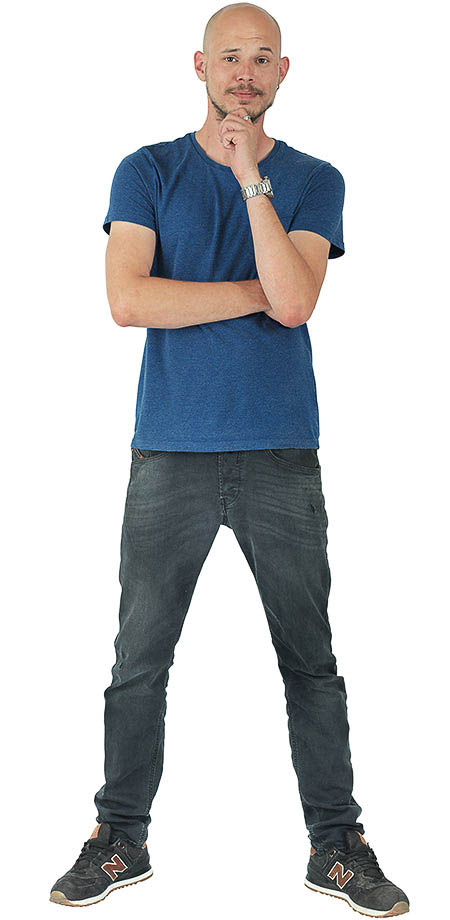INTERVIEW WITH DOMINIK EICHENBERGER,
HEAD OF QUALITY MANAGEMENT AND SUSTAINABILITY PROJECT LEAD
WE STAND BEHIND OUR ACTIONS
HOW MUCH DO YOU THINK ABOUT SUSTAINABILITY IN YOUR EVERYDAY HOME LIFE?
It’s quite a frequent occurrence. I might walk through a supermarket, for example, and stop to read a product label to see where it has come from or think about whether I have heard that a particular product is good or bad for the environment. But sometimes, if I’m being honest, I leave such concerns aside and choose to buy a product simply because I want to or because I like it. That’s all I have to say about shopping. But there are many other sides to sustainability. In your day-to-day behaviour, you can make more or less sustainable decisions. But even then, I can have more sustainable and less sustainable days.
WHAT DOES SUSTAINABILITY MEAN TO YOU?
It is, without doubt, the path we have to take, seeing as we live on a planet with limited resources. Living in a luxury country like Switzerland can make it even harder to make sustainable choices (in my opinion), as you are constantly bombarded by advertising for products that you, if you are honest with yourself, do not actually need, but simply desire because they are there – and just about affordable. Only recently, I actually caught myself looking at a new and improved tablet on the website of a well-known manufacturer. Funnily enough, I was looking at the new tablet on my existing, fully functional tablet. The realistic added value (apart from a few minor features) was so negligible that it made absolutely no sense to even consider it. Nevertheless, I look at the product and tell myself how much the purchase will benefit me. It’s not the manufacturers’ fault. They’re simply doing what they know best: selling great products with even better advertising. It is my responsibility to only buy the absolutely necessary, but it can be difficult as someone who loves gadgets because there are so many new and (supposedly) better products arriving on the market every day.
CAN KUHN RIKON ACTUALLY MAKE A DIFFERENCE IN TERMS OF SUSTAINABILITY?
We make decisions every day. What is important are the criteria on which we base our decisions. It is seldom or never the case that only one aspect is taken into account. You might want to produce a product a certain way to achieve the optimum quality. Of course, that would be nice, but who will then buy the product for CHF 1,200? Even if it is the best quality, handmade over a number of hours by master craftsmen, the price also has to be right. So something has to give. Is fast delivery also important? Then we cannot keep the good price etc. And we have now also decided to include another criterion in our decision making: sustainability. Of course, this is not only considered in the development of products, but in other areas too. It is important to remember that we are still very much at the beginning and ‘sustainable thinking’ has yet to become ingrained within the company, but we have to start somewhere, and we now have. I am looking forward to the day when we suddenly have different toilet tissue and everyone is up in arms that it is no longer as soft as the old one, but is, in turn, sustainably made. Not that I like rough toilet tissue, but then I will know that sustainability truly has arrived in every corner of the company (this is just an example; I’m sure sustainably-made soft toilet tissue also exists)
WHAT EXCITES YOU MOST ABOUT THIS PROJECT?
Let me start by saying that I am not a fan of ecolabels. Without wanting to attack any organisation in particular; with many labels that I consider or considered good, sooner or later a report comes out that entirely or partially casts doubt on their credibility or that indicates the process is not as you would expect. I, or we, only want to take action in the field of sustainability that we can stand behind and that brings demonstrable success (for us). As I said, I don’t want to lump all labels together, but I do not wish to pay any company money to confirm to the outside world that we are compliant with XYZ. I want to identify scope for improvement myself; for example, with a view to reducing our carbon footprint. Of course, we will also need external help so that we can benefit from the experiences of others; they will, in turn, want money from us and will mention our cooperation on their website. That’s how the world works. I am looking forward to identifying the great potential we have in the field of sustainability and making step-by-step improvements.
WHY ARE YOU THE RIGHT PERSON FOR THIS PROJECT?
Since I work in quality management (QM), I have the big advantage that I already have a good insight into and contact with all areas. QM is about embedding the internal and external requirements into the system to ensure that they are complied with and continuously improved upon on a daily basis. In principle, sustainability is exactly the same, except in this case the input is ‘sustainability’ rather than ‘quality’.


WOULD YOU BE THE RIGHT PERSON FOR A SUSTAINABILITY PROJECT?



 SWITZERLAND
SWITZERLAND SCHWEIZ
SCHWEIZ SUISSE
SUISSE FRANCE | BELGIQUE
FRANCE | BELGIQUE ESPAÑA
ESPAÑA DEUTSCHLAND | ÖSTERREICH
DEUTSCHLAND | ÖSTERREICH USA
USA UK
UK IRELAND
IRELAND CHINA
CHINA









